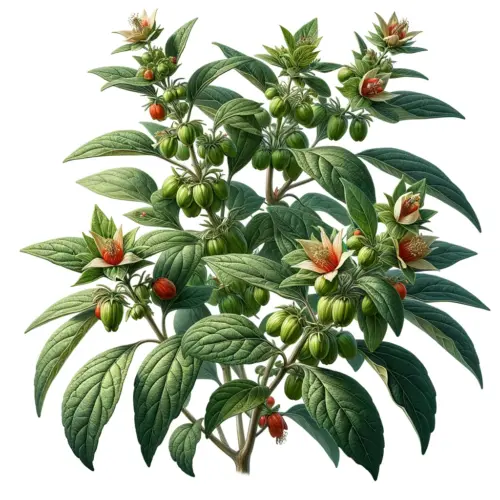
Ashwagandha, a revered herb in Ayurvedic medicine, has captured the attention of the global wellness community for its remarkable health benefits. Known scientifically as Withania somnifera, Ashwagandha has been used for over 3,000 years to relieve stress, increase energy levels, and improve concentration. This article delves into the multifaceted benefits of Ashwagandha, with a particular focus on the herbal tincture form, exploring its uses, side effects, and how it can be integrated into daily wellness routines.


What is Ashwagandha?
Ashwagandha belongs to the Solanaceae family and is recognized for its distinctive horse-like smell, which is the literal translation of its Sanskrit name. Traditionally used in Ayurvedic medicine to promote physical and mental health, balance the doshas, and enhance longevity, Ashwagandha’s roots and leaves are packed with bioactive compounds that contribute to its therapeutic effects.
Proven Health Benefits of Ashwagandha
Stress and Anxiety Reduction
One of the most celebrated effects of Ashwagandha is its ability to significantly reduce stress and anxiety levels. It regulates the body’s stress response by modulating the levels of cortisol, the stress hormone.
Improved Sleep Quality
Ashwagandha has been shown to enhance sleep quality by addressing sleep disorders and promoting restful sleep, making it a valuable natural remedy for insomnia.
Enhanced Physical Performance
Athletes and fitness enthusiasts may benefit from Ashwagandha’s ability to improve strength, muscle mass, and endurance, as evidenced by several studies.
Cognitive Health and Memory Support
The herb supports brain health by enhancing memory, reaction time, and the ability to perform tasks.
Immune System Boost
Regular consumption of Ashwagandha can strengthen the immune system, thanks to its anti-inflammatory and antioxidant properties.
Ashwagandha Herbal Tincture: An Overview
The Ashwagandha tincture, a liquid extract made from the herb’s roots, offers a concentrated and easily absorbable form of its active compounds. Tinctures are known for their quick absorption, making the effects of Ashwagandha more immediately noticeable compared to other forms.
How to Use Ashwagandha Tincture
For optimal benefits, the recommended dosage of Ashwagandha tincture is typically a few drops, taken 1-2 times daily or as advised by a healthcare provider. It can be mixed with water, tea, or any beverage of choice.
Side Effects and Precautions of Ashwagandha
While Ashwagandha is generally safe for most people, it can cause mild side effects such as nausea, diarrhea, and vomiting in some individuals. It is crucial to consult with a healthcare professional before starting any new supplement regimen, especially for pregnant or breastfeeding women, individuals with autoimmune diseases, and those on medication.
Conclusion
Ashwagandha stands out as a versatile and potent herb with a wide range of health benefits, particularly when consumed in the form of a herbal tincture. Whether you’re looking to reduce stress, improve sleep, enhance physical performance, or boost cognitive function, Ashwagandha offers a natural and effective solution. As with any supplement, it’s important to use Ashwagandha responsibly and consult with a healthcare professional to ensure it’s suitable for your health profile and needs.
